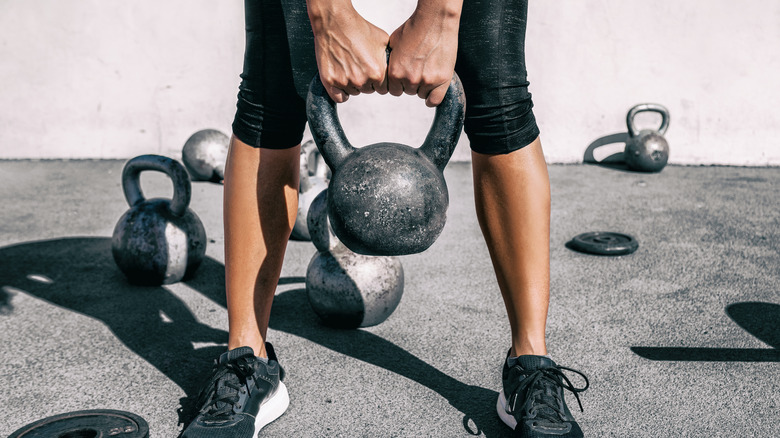This Type Of Protein Powder Won't Help You Build Muscle
If you want to achieve fitness goals without breaking the bank, you might be tempted to opt for budget protein powders. But, before you do, it's important to understand their potential setbacks. Cheap protein powders may provide a decent amount of protein but often lack specific amino acids essential for supporting muscle growth.
Amino acids are crucial for muscle growth and post-workout recovery — specifically, branched-chain amino acids (BCAAs). A high-quality protein powder is abundant in BCAAs (valine, leucine, and isoleucine), which play a crucial role in muscle growth. Without these vital amino acids, your progress toward lean muscle mass can be hindered. And that's not all. When protein powders lack amino acid content, your muscles are left without the essential raw materials required for repair and growth. This can result in delays in muscle recovery and suboptimal performance. The path to success starts with a label, and deciphering it is the key.
The power of amino acids in protein powders
Amino acids can be classified into three groups: essential, non-essential, and conditional (per Healthline). Essential amino acids are crucial for muscle growth since the body cannot produce them on its own. You can get them through dietary intake or supplements as recommended. Among these essential amino acids, branched-chain amino acids (BCAAs) are especially important when it comes to building lean muscle mass.
According to a 2015 study in Amino Acids, leucine is the most essential amino acid for promoting muscle growth. It activates the muscle protein synthesis pathway and inhibits the muscle protein breakdown pathway, which makes it a great muscle-building agent. A 2021 study published in Food and Function found that isoleucine promotes muscle growth by stimulating muscle protein synthesis, which is the process of building new muscle proteins. Isoleucine also helps to reduce muscle breakdown after exercise. Valine helps to improve muscle glycogen synthesis and storage after exercise. Glycogen is the body's primary energy source during exercise, so enhanced glycogen synthesis and storage can help improve athletic performance and recovery.
Since different protein sources contain varying amounts of these amino acids, some cheaper options might not have enough of the amino acids you need. Don't just focus on the protein content alone; make sure you pick a powder with the correct amino acid profile.
How to identify quality protein powders
Choosing the best protein powder can be tricky, but ensuring you're getting the most out of your workouts is essential. Look for products that clearly state the types and amounts of amino acids they contain, especially the essential BCAAs (leucine, isoleucine, and valine). A high-quality protein powder should have a well-balanced amino acid profile with plenty of these muscle-building essentials.
Different protein sources provide distinct benefits (per the Journal of Sports Science and Medicine). For example, whey protein is great for post-workout recovery due to its quick absorption and high BCAA content. On the other hand, casein protein releases amino acids slowly, which is perfect for sustained muscle nourishment. If you're a vegetarian or vegan, plant-based options like pea, rice, or hemp protein may be a good choice, but you might need to combine them to get a complete amino acid profile.
Choose reliable brands that have undergone third-party testing for quality and accuracy. Look for certifications from organizations like NSF International, Informed-Choice, or ConsumerLab. Check what's in the protein powder. Avoid products with fillers, artificial additives, or excessive sweeteners. The fewer ingredients, the better. Taste is also essential for satisfaction. Read reviews and try samples. A good powder should mix easily without clumping or foaming. Follow these tips to choose a protein powder that matches your fitness goals.



